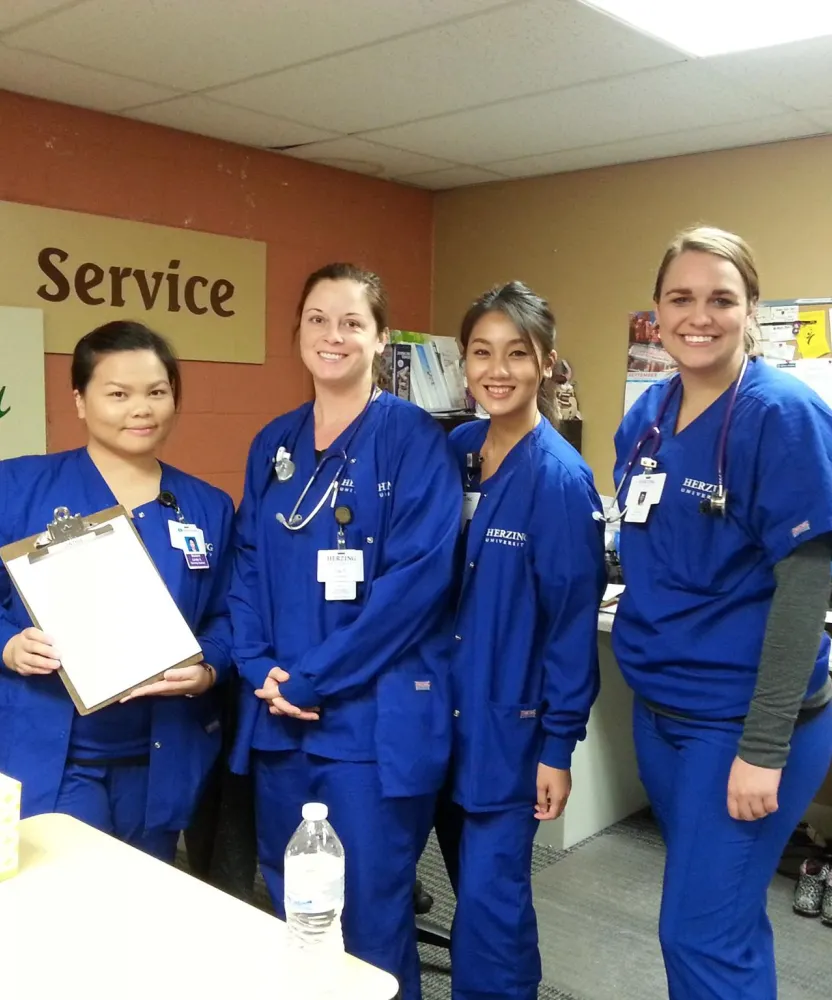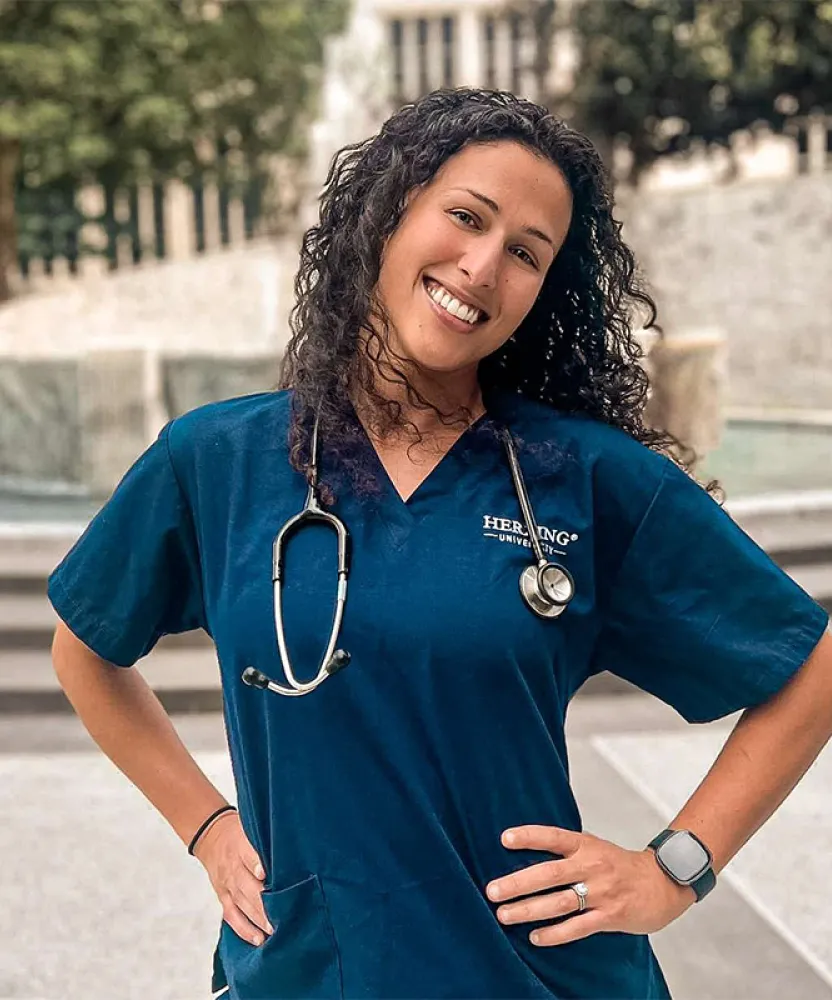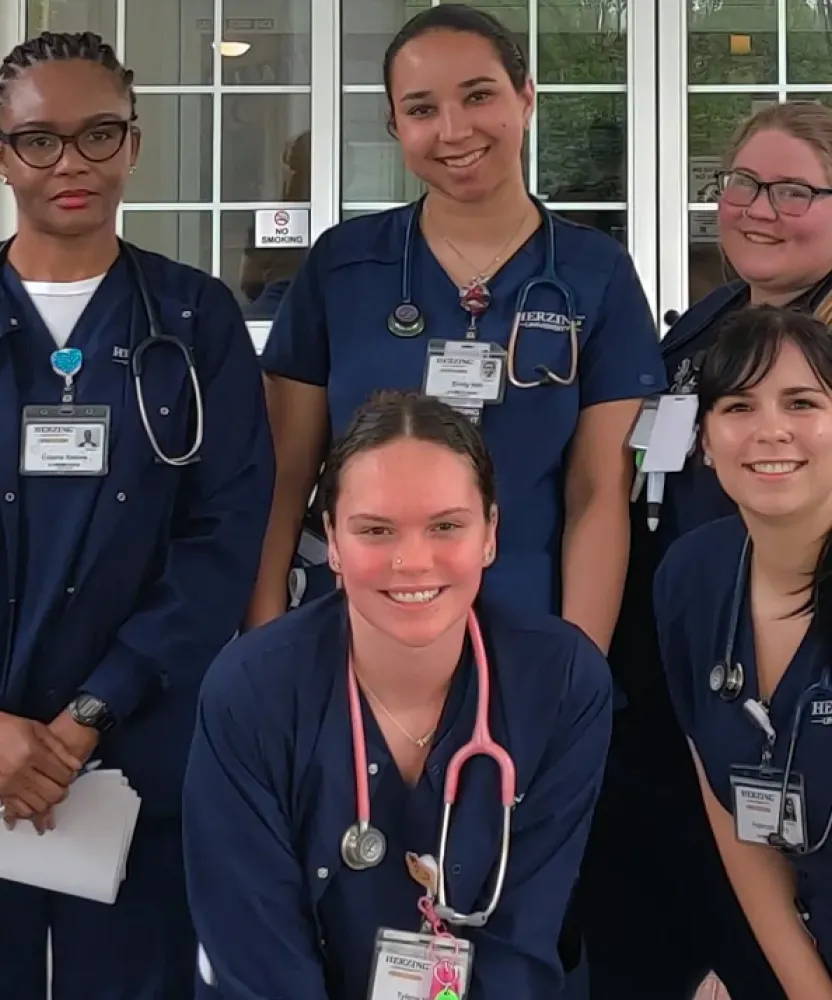Quick facts about our online MSN Direct Entry Program
| Accreditation | CCNE accredited,2 Accredited by the Higher Learning Commission |
|---|---|
| Format | 100% online didactic classes, including both on-demand and real-time learning with flexible scheduling; the hybrid format includes labs and simulations held at our Kenosha campus; the online format includes three 2-4 day intensives at our Brookfield, WI or Nashville, TN campuses |
| Admissions | Designed for non-nurses; non-nursing bachelor's degree required for admissions |
| Eligibility | Available for enrollment in select states3 |
| DNP Dual Credit | Earn dual credit towards a Doctor of Nursing Practice (DNP) |
| QuickPaths | Build a foundation to pursue an advanced specialty in a future post master's certificate program; transfer credit, stackable credentials, and adaptive learning technology build a faster pathway to a higher education with Herzing |
Learn More Today!
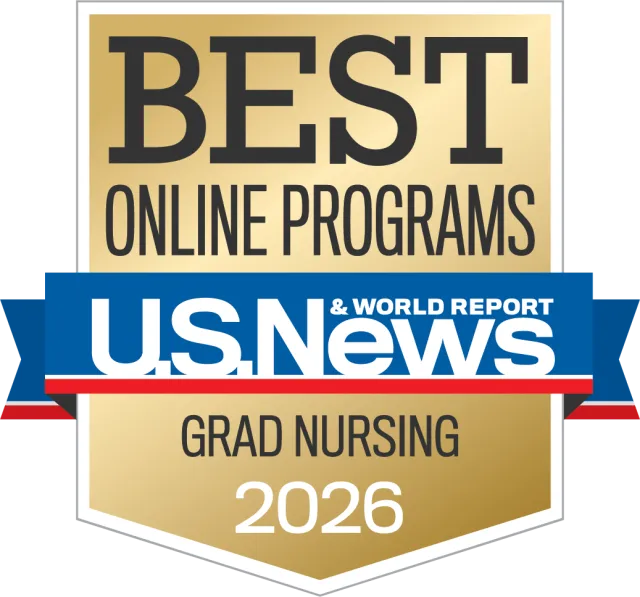
Ranked by U.S. News & World Report as one of the best online graduate nursing programs in 2026
Find your path into nursing with our MSN Direct Entry Program
The Master of Science in Nursing (MSN) Direct Entry degree is a 60-77 credit graduate program which prepares non-nursing majors for a career as an MSN-prepared Registered Nurse (RN). The degree program provides students with fundamental knowledge and skills in pathophysiology & pharmacology, scholarly practice, mental health nursing, nursing informatics and healthcare technology, population health, and much more.
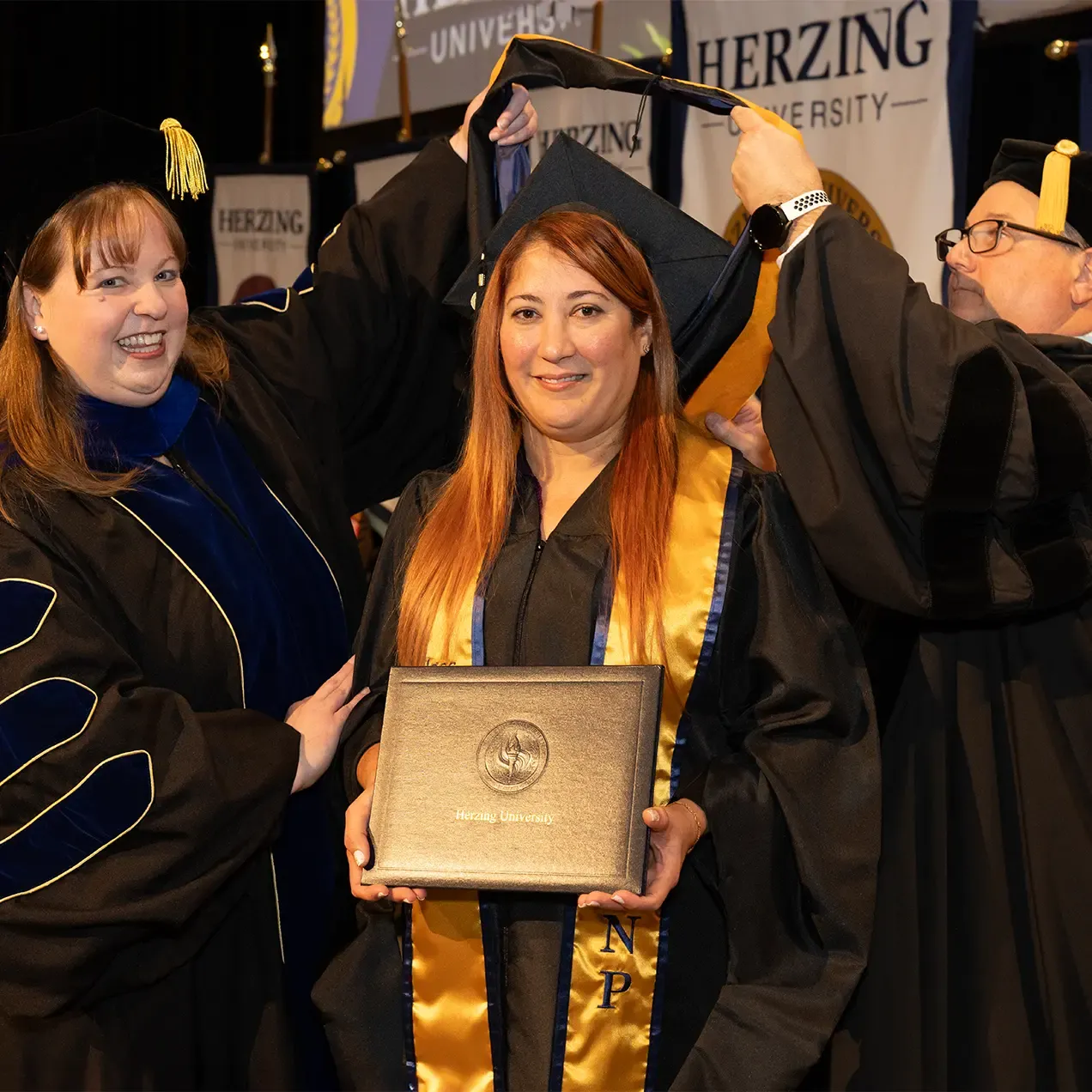
Career-focused curriculum
Discover the crucial knowledge and skills required to succeed in your work and build a foundation for continued career growth.
Flexible schedule
We work hard to help you maintain school-life balance, striving to be as flexible as possible for busy non-traditional students.
Virtual services
Access to extensive virtual services, including academic advising, tutoring, support services, technical support and library services.
Lifelong support
We support your ongoing career advancement by providing comprehensive, personalized student services with lifelong career coaching.
Rolling admissions
No application deadlines to worry about. Apply when you’re ready and prepare to get started soon.
Your pathway: classes and curriculum details
The online MSN-DE program covers 60-77 credits, including online coursework, skills training and clinical experience. It is designed to help you gain the clinical skills and experience you need to provide patient-centered care, pass the National Council Licensure Exam (NCLEX-RN) and obtain licensure to practice as a registered nurse (RN).
Students who meet the undergraduate general education requirements can complete the program in as little as 20 months (60 credits).
| Program | Months 2 | Credit |
|---|---|---|
| Master of Science in Nursing - Direct Entry | 20-24 | 60-77 |
Required Undergraduate Pre-Requisite Core Courses
All courses, 17.00 semester credit hours, are required. The following courses, or the equivalent, must be successfully completed prior to entry in the core nursing courses:
Note: Students must earn a "B" or better in both the SC 154 Anatomy and Physiology I for Nurses and SC 254 Anatomy and Physiology II for Nurses courses.
Required Courses in Nursing
All courses, 60.00 semester credit hours, are required.
Resuming students should refer to the section on re-entering for additional requirements.
Distribution of Contact Hours by Course
Distribution of Contact Hours by Course Course Number Lecture Hours Lab Hours Clinical Hours Total Contact Hours Credits MA 320 45.00 0.00 0.00 45.00 3.00 SC 154 45.00 30.00 0.00 75.00 4.00 SC 166 30.00 30.00 0.00 60.00 3.00 SC 186 30.00 30.00 0.00 60.00 3.00 SC 254 45.00 30.00 0.00 75.00 4.00 NSG 520 60.00 0.00 0.00 60.00 4.00 NSG 521 75.00 0.00 0.00 75.00 5.00 NSG 522 0.00 30.00 45.00 75.00 2.00 NSG 523 60.00 0.00 0.00 60.00 4.00 NSG 524 45.00 0.00 0.00 45.00 3.00 NSG 525 0.00 0.00 135.00 135.00 3.00 NSG 526 60.00 0.00 0.00 60.00 4.00 NSG 527 75.00 0.00 0.00 75.00 5.00 NSG 528 0.00 0.00 135.00 135.00 3.00 NSG 621 0.00 0.00 135.00 135.00 3.00 NSG 631 30.00 0.00 45.00 75.00 3.00 NSG 632 15.00 0.00 90.00 105.00 3.00 NSG 633 45.00 0.00 0.00 45.00 3.00 NSG 635 45.00 0.00 0.00 45.00 3.00 NSG 660 45.00 0.00 0.00 45.00 3.00 NU 725 45.00 0.00 0.00 45.00 3.00 NU 730 45.00 0.00 0.00 45.00 3.00 NU 780 45.00 0.00 0.00 45.00 3.00 Totals 885.00 150.00 585.00 1620.00 77.00
Online & In person
What's Online, and What's In-person?
Online
All online didactic, lecture-style courses may be completed asynchronously (24/7 on your schedule) through the Herzing University Canvas Learning Management System.
Clinical instructor and peer collaboration requirements will be done via synchronous (live) distance learning, which will be required at times throughout the program.
Our online classes provide the foundational nursing knowledge and skills you need to prepare for in-person clinicals and intensives.
In-person
Practical, hands-on training supplements your online learning to provide the well-rounded education you need to succeed as an MSN-prepared RN. Our curriculum includes:
Clinicals. You’ll complete a total of 585 clinical hours over the course of the Direct Entry MSN program. We use traditional faculty-led rotations and/or a precepted model for student clinical experiences in our online nursing programs, and we have a dedicated team to help you find clinical placement.
Labs, clinicals, and/or intensives. You will attend three 2-4 day intensives on-campus in Brookfield, WI or Nashville, TN if you elect the online format. They will include skills introduction, skills checks, testing and faculty advisement to ensure you’re on the right track. The hybrid format includes labs and simulations held at our Kenosha campus.
Tuition & Cost
Tuition & Cost
The cost of tuition for the MSN - Direct Entry program is $790 per credit.
You can potentially earn even greater savings by transferring credit from prior college coursework, applying for financial aid, or potential partnership opportunities through your employer.
Our goal is your career advancement. That's why we are always working to improve our curriculum and processes to make our program as affordable as possible while preparing you best for success in your work.
Scholarships & Financial Aid
You may be eligible for multiple scholarships and grants—including our Nurses Circle of Achievement scholarship, which offers up to 10% tuition reduction.
Military/Veteran Discounts
Veterans, Active Duty U.S. Servicemembers, and spouses may qualify for a 10-20% tuition discount.
MSN Direct Entry Enrollment Requirements
Prerequisites to enroll in the Herzing Direct Entry MSN program include:
Prior education
Evidence of graduation from a non-nursing bachelor’s degree program awarded by an accredited institution of higher education
Minimum GPA
3.0 GPA
Entrance testing
Aggregate score of 66 on the Test of Essential Academic Skills (TEAS). No GRE required.
Students will be assessed on their collegiate cumulative GPA from either a non-nursing bachelor’s degree or master’s degree program.
The following courses, or the equivalent, must be successfully completed prior to entry in the Master of Science in Nursing - Direct Entry core nursing courses:
Statistics
3 credits
Anatomy & Physiology I
4 credits; must earn "B" or better
Anatomy & Physiology II
4 credits; must earn "B" or better
Chemistry
3 credits
Microbiology
3 credits
Alternative entry points: if your GPA is too low, or you do not hold a non-nursing bachelor’s degree, you may also consider several undergraduate nursing degree options. We offer nursing programs at the bachelor’s, associate, and diploma levels—if you want to become a nurse, we offer a pathway to help you start your journey.
- Alabamai
- Coloradoi
- Florida
- Georgia
- Hawaiii
- Idahoi
- Illinois
- Indiana
- Iowai
- Kansasi
- Kentucky
- Louisianaii
- Marylandi
- Michigan
- Minnesota
- Missourii
- North Carolina
- Ohio
- Oklahomai
- South Carolina
- South Dakotai
- Tennessee
- Virginia
- Wisconsin
iAt this time, we have reached full enrollment capacity for prelicensure nursing students from Alabama, Colorado, Hawaii, Idaho, Iowa, Kansas, Maryland, Missouri, Oklahoma, and South Dakota. We carefully manage enrollment to ensure a high-quality educational experience for every student. Please check back for future updates to enrollment status.
iiLimited to 100 mile radius of physical campus (New Orleans).
Meet Our Leadership
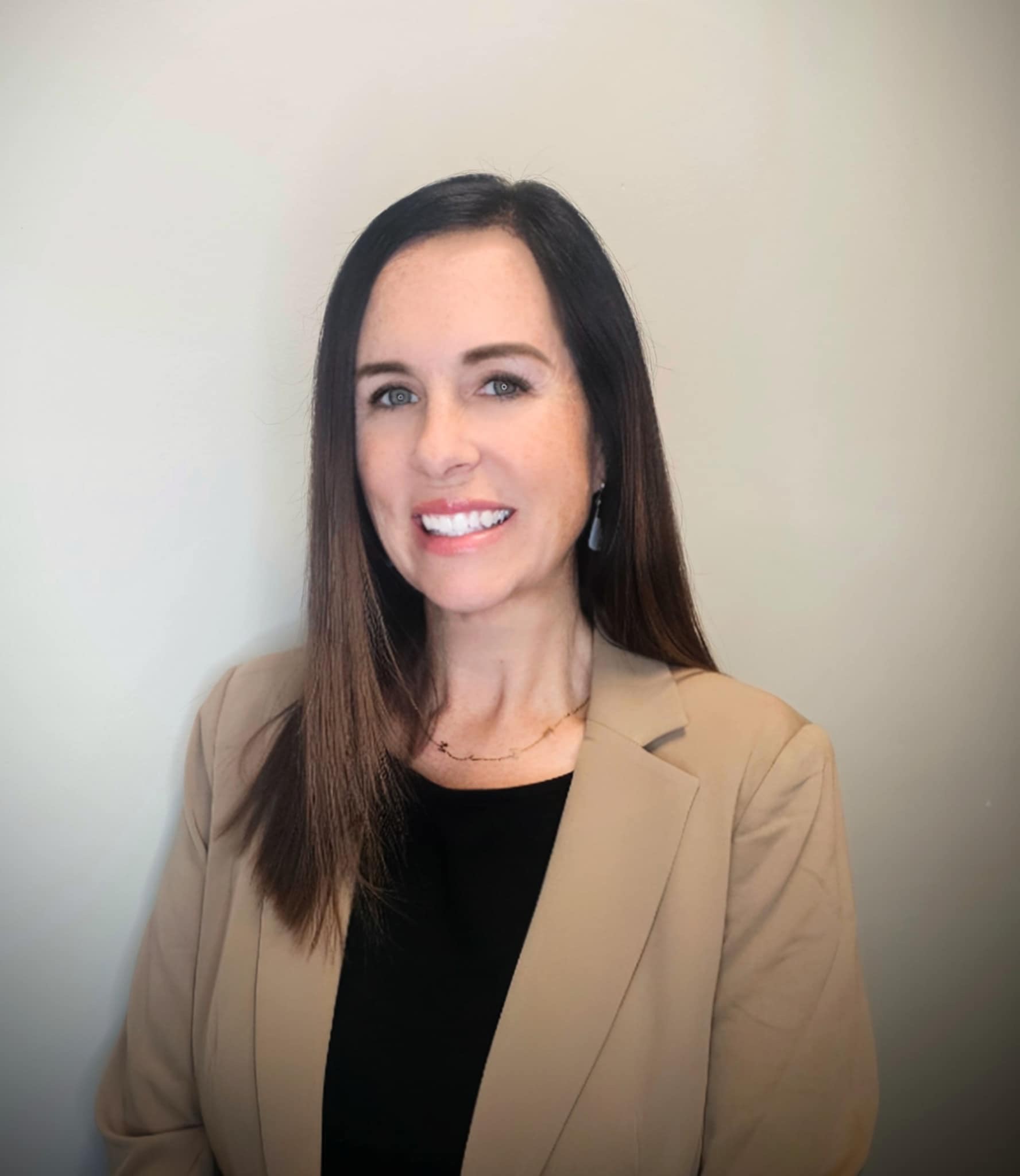
Herzing’s Master of Science in Nursing Direct Entry program prepares individuals with a non-nursing bachelor’s or higher degree to launch a rewarding career in healthcare.
Through hands-on clinical experiences, immersive simulation, and advanced coursework, students develop the knowledge, skills, and confidence to practice at the master’s level.
Graduates are ready to provide compassionate, evidence-based care and pursue leadership roles or continue their education in advanced nursing programs."
Dr. Stephanie Black DNP, RN
Dean of Prelicensure NursingDr. Stephanie Black is a distinguished nurse leader with over 20 years of experience in nursing education and healthcare leadership. She currently serves as Dean of Prelicensure Nursing at Herzing University, where she leads strategic initiatives to strengthen nursing programs across multiple campuses and online. Her work centers on advancing academic excellence, preparing practice-ready graduates, and driving strong NCLEX outcomes.
With expertise in curriculum design, faculty development, and simulation-based learning, Dr. Black is committed to building inclusive, student-centered environments that empower the next generation of nurses. A passionate advocate for global health, she has coordinated international exchange programs and clinical immersion experiences in underserved communities. She also partners with organizations such as Filter of Hope to address global water quality needs.
Dr. Black is an active member of Sigma, AACN, NLN, ICN, and MONA contributing to the broader conversation on nursing education and health equity. She holds a DNP in Nursing Education, an MSN, and a BSN, and is committed to advancing the nursing profession worldwide.
What Can You Do With an MSN?



The purpose of our Direct Entry MSN program is to fully prepare you to take the NCLEX-RN and become a Registered Nurse (RN).
The Direct Entry MSN pathway is designed to expedite the process for students who already hold a non-nursing bachelor’s degree.
While a master’s degree is not required to become an RN, a master’s-level education gives you a head start on advancing your nursing career.
Earning an MSN opens doors to many possibilities in advanced practice nursing. This is an opportunity for you to pursue graduate-level nursing pathways and minimize your cost and time.
Job Outlook
According to the Bureau of Labor Statistics (BLS), employment of registered nurses is expected to increase 9% from 2020-2030.*
Now is an excellent time to begin working towards becoming an RN with goals of advancing even higher.
Advanced Practice Registered Nurses (APRN) are also projected to be in very high demand in coming years. The BLS expects employment of nurse anesthetists, nurse midwives, and nurse practitioners to greatly increase—largely boosted by a 45% growth estimate for nurse practitioners from 2022-2032.*
The Student Experience at Herzing
All the courses provided by Herzing during my program were valuable in preparing me for my career. The best part was that it didn’t take me that long to complete my degree!
Jacqueline Elaine White
Nursing Student | Online CampusAdvance to the highest levels faster
By committing to the MSN pathway right from the start, you can position yourself best for graduate-level specialization in the future. Upon graduation, you can potentially leverage your MSN into post master’s certificate programs in several different specialties:
- Adult Gerontology Acute Care Nurse Practitioner (AGACNP)
- Adult Gerontology Primary Care Nurse Practitioner (AGPCNP)
- Family Nurse Practitioner (FNP)
- Nursing Education (Nurse Educator)
- Nursing Leadership & Administration
- Pediatric Nurse Practitioner (PNP)
- Psychiatric Mental Health Nurse Practitioner (PMHNP)
- Public Health (PH)
- Women's Health Nurse Practitioner (WHNP)
Faq
Frequently Asked Questions
Didn't find the answer to your question? Send us an inquiry and we will be happy to answer all your questions!
No, but you can get much closer to reaching that goal. You will need to complete additional education in the NP specialty of your choosing before becoming eligible to practice.
After completing the direct entry MSN program, you are eligible to enroll in a post master’s certificate program to help you prepare to become a nurse practitioner.
We currently offer post master’s certificate concentrations in:
"Registered nurse" represents a broad category of potential duties involving many areas of healthcare. The typical roles and responsibilities of an RN span several categories, including:
We offer online associate, bachelor's, and master's degree pathways for those without nursing experience looking to become an RN. Eligibility varies by state of residence.
Learn more about our online nursing programs designed for non-nurses.
Increasingly yes, but it ultimately depends on the institution who issued the degree.
As the popularity of online degrees continues to rapidly trend upward, so has mainstream acceptance of online degree programs.
Attitudes toward online degrees were already becoming more positive before the COVID-19 pandemic forced the issue. According to a 2019 study from Northeastern University, 61 percent of HR leaders say online learning is “of equal or greater quality to more traditional methods.” More than half believe that in the future, most advanced degrees will be online.
Regarding nursing applicants who earned online degrees, there are a few important factors employers consider:
- The school and degree program’s accreditation. Herzing University is accredited by the Higher Learning Commission (HLC) and programmatically accredited by the Commission on Collegiate Nursing Education (CCNE).i
- If you have earned nursing licensure. Our programs are designed to help you pass any necessary exams and become licensed before getting your first job.
- The school’s reputation and history of producing excellent employees. Consider our many happy graduates and 50+ years producing more than 40,000 alumni.
For all these reasons employers know what it means when they see “Herzing University” on a resume!
i. Programmatic accreditation varies by program and by campus location. Find details about all Herzing University accreditations and approvals.
We recommend that you keep work to a minimum during the program given the required synchronous sessions and overall volume of work needed for success.
The highest degree, or terminal degree, in nursing is the doctoral degree.
We offer the practice-focused Doctor of Nursing Practice (DNP) for students seeking to ascend to the highest ranks of the nursing field and begin making a significant impact in how nursing is implementing evidence-based practice and researching into the practice setting.
After completing the direct entry MSN program, you may be eligible to enroll in our post master’s DNP program or MSN to DNP options featuring several potential specializations.
According to the Bureau of Labor Statistics, registered nurses earn an average salary of $98,430 per year ($47.32 per hour).*
There are a wide variety of different career paths in nursing, and depending on what makes the most sense for you there are several different types of nursing degrees you may consider:
- Diploma in Practical Nursing. The fastest way to start your nursing career is to earn a diploma in practical nursing and become a Licensed Practical Nurse. This isn’t a “degree” but it’s an alternative starting point if you’re ready to get your feet wet in nursing.
- Associate degree in nursing. Earn an associate’s degree in nursing and you’ll be eligible to sit for the NCLEX and become a Registered Nurse (RN).
- Bachelor’s in nursing. A bachelor’s degree is becoming the new educational standard for registered nurses, and it will qualify you for a master’s degree program.
- Master’s in nursing. Many roles up the ladder in nursing will require a master’s degree.
- Doctorate in nursing. Earn the terminal degree in nursing and reach the top of the field.
All schools have their own distinct degree programs based on their qualifications and areas of focus. Herzing University offers many different options to provide the shortest path to your destination no matter where you are right now, including campus bridge programs and online programs to help you reach the next level in your education. View all of our nursing programs.
Our MSN Direct Entry program provides clinical experiences through traditional faculty-led rotations and/or a precepted model.
Upon admission, you will complete a form to help guide your clinical placement. This includes identifying local sites where you would like to complete clinical hours or locations of potential career interest.
Our clinical placement team will assist with securing a preceptor or placing you in a faculty-led rotation. We partner with a variety of clinical sites, ideally within 100 miles of your location. While student input is valuable, specific placements or preceptors cannot be guaranteed.
Meeting all clinical preparedness requirements is mandatory prior to placement. This includes immunizations, background checks, drug screening, CPR certification, and site-specific onboarding, as applicable.
Some clinical components, such as basic skills checks or faculty advisement, may be completed virtually through synchronous sessions.
Program Finder
MSN - Direct Entry
OnlineTo learn more about this program, click the Request Info button.
Accreditation & Disclosures
- 1. Completion time based on transfer credit for undergraduate general education courses.
- 2. The master's degree program in nursing at Herzing University Madison is accredited by the Commission on Collegiate Nursing Education (http://www.ccneaccreditation.org). Herzing University is approved to offer programs in an online learning modality through association with the main campus in Madison, Wisconsin.
- 3. Eligible states for enrollment: Alabama, Colorado, Florida, Georgia, Hawaii, Idaho, Illinois, Indiana, Iowa, Kansas, Kentucky, Louisiana,i Maryland, Michigan, Minnesota, Missouri, North Carolina, Ohio, Oklahoma, South Carolina, South Dakota, Tennessee, Virginia, and Wisconsin.
At this time, we have reached full enrollment capacity for prelicensure nursing students from Alabama, Colorado, Hawaii, Idaho, Iowa, Kansas, Maryland, Missouri, Oklahoma, and South Dakota. We carefully manage enrollment to ensure a high-quality educational experience for every student. Please check back for future updates to enrollment status.
Limited to 100 mile radius of physical campus (New Orleans)
Herzing University is accredited by the Higher Learning Commission (hlcommission.org), an institutional accreditation agency recognized by the U.S. Department of Education.
* BLS pay estimates calculate the median annual wage for various occupations. Per the BLS the median wage for an occupation is: "The wage at which half of the workers in the occupation earned more than that amount, and half earned less. Median wage data are from the BLS Occupational Employment and Wage Statistics survey." Bureau of Labor Statistics (BLS), U.S. Department of Labor, Occupational Outlook Handbook 2024. BLS median wage estimates do not represent entry-level wages and/or salaries. Multiple factors, including prior experience, age, geographic market in which you want to work, and degree level and field, will affect career outcomes, including starting salary and earnings as an experienced employee. Herzing neither represents that its graduates will earn the median salaries calculated by BLS for a particular job nor guarantees that graduation from its program will result in a job, promotion, particular wage or salary, or other career growth.
Recent Blog Posts
Waived Enrollment Fee
Discover the educational pathway designed to maximize your career potential. Reach for greater heights with Herzing University.

